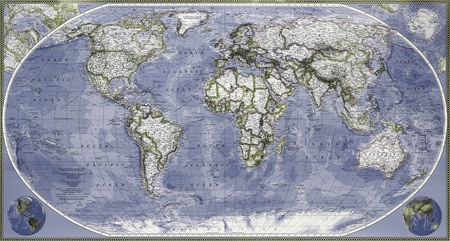The term "globalization" is ubiquitous today: it is used sometimes to explain contemporary economic difficulties, sometimes to celebrate advances in communication. But behind this word lie profound transformations. Cochrane and Pain identify four main ones:
the extension of social relations on a global scale,
the intensification of flows,
the interpenetration of social and economic practices,
and the emergence of a global institutional infrastructure.
There are three main perspectives that allow us to question globalization: the globalists, the internationalists, And the transformationalistsLet us examine their contributions and their limits, particularly from a political point of view.
The globalist vision: globalization as a new and irreversible fact
Globalists view globalization as an unprecedented and inevitable phenomenon, which escapes the control of traditional institutions such as nation-states.
Their political arguments:
Mass migrations Since the 1950s, they have created influential diasporas, changing diplomatic relations, as in the case of Chinese communities in Africa.
Global issues, like the environment, show that national decisions now have global repercussions (e.g. Chernobyl).
The rise of international organizations, notably UN agencies or the European Union, encroaches on state sovereignty.
The global diffusion of information and cultural patterns, through technologies and multinationals, reduces the scope for action of States.
The internationalist position: the continuity of nation-state power
On the other hand, internationalists believe that States retain their political primacy, despite current changes.
Their arguments:
The history of migrations shows that they are not new: they have always accompanied conquests, famines, or human curiosity.
States use international organizations as arenas for negotiating their national interests.
The theory of hegemonic governance, with the example of the management of the Asian crisis by the United States in 1997-98, illustrates how the great powers impose their rules.
The Westphalian system remains dominant : States retain authority over their territory, resources and population, including at the regional or global level.
The transformationalist approach: towards a redefinition of political power
Transformationalists take a more nuanced and realistic position. For them, political power changes its nature, without disappearing.
Their analyses:
Power becomes multi-level : it is divided between supranational structures (UN, EU, G8), subnational (cities like Glasgow or Coventry), and transnational (NGOs like Amnesty International or Greenpeace).
There transnationalization of political activities, particularly through NGOs, is accelerating. We have gone from a few hundred international NGOs at the beginning of the 20th century to more than 5,000 in the 21st century.
The power of NGOs is manifested through global campaigns, like the one against the AMI, showing the emergence of a global civil society.
Transformationalists criticize the other two approaches for their determinism: globalists neglect the role of actors, internationalists underestimate the changes underway. They emphasize the importance of agents of change, capable of shaping global politics.
Changing governance: from anarchy to heterarchy
We are witnessing a gradual shift from an anarchic world—without authority above states—to a heterarchy, where power is shared between several levels and actors.
This complex system makes it difficult to measure systemic risks, as the multidimensional crises since 1998 have shown: financial, social, environmental.
Change is not in itself a novelty in human history. But the way political power is evolving today is deeply marked by the globalization of structures and actors.
Conclusion: Globalization, Change and Uncertainty
So, is globalization new and inevitable?
The answer depends on the angle you take. What is certain is that the political power is being redefined, that the actors are multiplying, and that the outcome remains uncertain.
But this process of transformation is indeed underway - and this is what makes it such a crucial object of study for thinking about the future of politics.
References
McGrew, A. (2004). Power Shift: From National Government to Global Governance. In Held, D. (Ed.), A Globalizing World? Culture, Economics, Politics, London: Routledge/Open University.
Cochrane, A. & Pain, K. (2004). A Globalizing Society? In Held, D. (Ed.), A Globalizing World?, London: Routledge/Open University.


